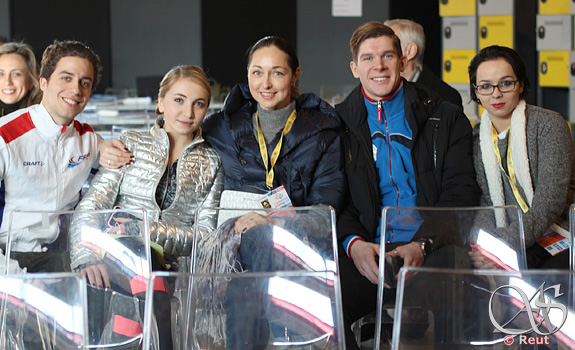Anjelika Krylova: "I love to always be busy"
November 27, 2019
By Reut Golinsky
Photo © Mikhail Sharov, Polymnia, Ksenia Nurtdinova, Reut Golinsky
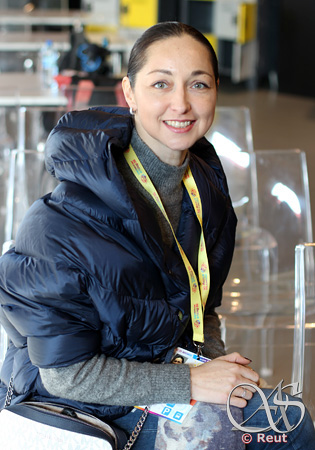 The 1998 Olympic silver medalist and two-time World champion Anjelika Krylova who, after ending her career, worked for over twenty years as a figure skating coach and choreographer in the US, has returned back home to Russia. Since the summer of 2018 she's been in Moscow, coaching young and senior Russian skaters, and a few international ice dance couples as well.
The 1998 Olympic silver medalist and two-time World champion Anjelika Krylova who, after ending her career, worked for over twenty years as a figure skating coach and choreographer in the US, has returned back home to Russia. Since the summer of 2018 she's been in Moscow, coaching young and senior Russian skaters, and a few international ice dance couples as well.
We met in Bratislava during the Nepela Memorial and talked about all the recent changes in her life, her leading skaters, development of the ice dance as a sport and more.
Anjelika, this is your second season coaching in Russia. How has it all began a year and a half ago and how are things going right now?
I visited Moscow a few times in spring 2018 and then, in the last week of June, I moved permanently, immersing myself in coaching work at once, as we were preparing towards the new season. Of course, the whole training system is quite different there. Well, you can say that everything is different. (smiles) I needed to organize myself, to find enough ice time, to gather a group of students. A lot of effort was put into it, but I don't regret anything, I really like being there.
Currently we have two ice rinks we work on; I coach senior and junior ice dancers at Megasport arena, while younger skaters - novice teams and younger - are training in Krylatskoye (an indoor ice arena for speed skating and bandy located in Krylatskoye District of Moscow - ed).
How did you assemble your group?
A lot of young children came to auditions. For more advanced levels skaters approached me and asked to work with them; we had tryouts and then took a decision. I feel that eventually we've created a really good group and we work with it. Apart from finding students I also needed to form a coaching team, which was a very important task too. We have a choreographer, an off-ice body-conditioning coach. Albena Denkova and Maxim Staviski work with us, Oleg Ovsyannikov is helping as well.
In one of your recent interviews you mentioned that Ruslan Zhiganshin has joined your team too.
Yes, he came to us during this off-season. I really needed more help because we have couples on very different levels. I was looking for a young professional, a good skater. And he just recently competed at a high level. I wanted to meet him, so I called him and asked whether he might be interested in working with me, working with ice dancers, as back then he was working with single skaters. He answered that he would be very interested to try. He still had some projects and camps, and afterwards we met and talked. And he started working with us. Our skaters get on well with him, they love him. I enjoy working with Ruslan and hope our collaboration will continue.
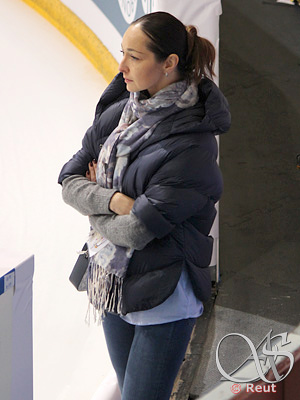 Does he have any specific role in your team? Or is he responsible for everything?
Does he have any specific role in your team? Or is he responsible for everything?
He will work on everything, with younger skaters mainly, at first he will help with those. He needs to study all the rules carefully, needs to understand how the work goes, needs to go to competitions and see how they work, because it's a completely different experience when you compete yourself or when you coach someone and bring them to the event.
When and how has this decision to come back to Russia appeared?
You know, I wanted to do it for a while. I missed Russia, and my heart was always there. But it so happened that for over twenty years I lived in the United States. After we retired from competitive skating, we continued to tour with shows and we lived in Delaware, the same place where we were training with Linichuk and Karponosov. Then an invitation from the Detroit Skating Club came, we moved there and stayed for ten years. Conditions were great and we created a really good group. But my wish to come back to Russia has never left me. And so I decided that in the season after the Olympic Games I'm returning home. I decided to try and see how it goes. Of course, it was a serious step for me, and for my children, because they are still small - my daughter is 14, my son is 12. Obviously they were my main point of concern. I wasn't worried for myself, I knew I would be comfortable, because I'll be at home.
Do your children speak Russian?
A year before we moved, I started to work on this, found a Russian tutor for them. And in Moscow I arranged for them to go to an English-speaking school. Of course, Russian is not their mother tongue and I don't think it will ever become one. They talk to each other in English, they are used to talk to me and their father in English, it's comfortable for them and I don't want to put them into a situation that's too harsh. I hope with time it will be easier for them.
Let's talk about the couples you're working with.
I have two junior Russian couples, young and very promising, - Vasilisa Kaganovskaya/Valeri Angelopol and Daria Gureeva Maksim Serov.
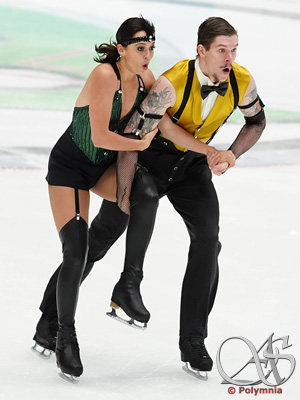 In seniors I have Betina Popova and Sergey Mozgov, they are still gaining experience, but I believe they have big potential. Competition among Russian ice dance couples is very tough, so we need to work a lot. They are not in a leading position yet, but we will try hard [to be there], I think they deserve it.
In seniors I have Betina Popova and Sergey Mozgov, they are still gaining experience, but I believe they have big potential. Competition among Russian ice dance couples is very tough, so we need to work a lot. They are not in a leading position yet, but we will try hard [to be there], I think they deserve it.
They have vivid personalities and always stand out with their programs. Who usually brings ideas to the table?
When I work with my students, during the initial steps of choreography and choosing the music I always try to listen to what they have to say. We discuss things, I never impose my vision. Yes, I also make suggestions, and they make suggestions, and so we try to find something we all agree upon. Because they need to enjoy skating to this [music], they need to feel the character [of the program]. Usually at the very beginning of the creative process we have 2-3 ideas which we just try on the ice, improvise, experiment. We check how the music works on the ice, because listening to music [in your headphones] can be quite different from how it sounds at the ice rink.
Last season I especially loved Betina and Sergey's exhibition number as Power Rangers. Was it their own creation?
Yes, that was completely their idea. They came to me and asked what I think about an exhibition program to this theme. It's an American franchise, I know it well, and my children watch these films and play these games. It was an off-beat, unusual theme, nobody ever skated to it. And it's wonderful that they stood out with it, they were noticed, people talked about them. Maybe not everything in that program was prepared and performed as well as we'd wanted, but nevertheless the idea was great.
I understand that Betina and Sergey are now leaders of your group, which is a relatively new role for them. How does it work for them to be the leaders?
They cope with this role well, they know that the group follows them, they feel responsibility, which is good for them too, I think. During our training sessions, when we have many couples on the ice, they always look at each other, try to reach each other, and that's great.
Tell me more about the other senior couples you are coaching now.
Freanch team, Adelina Galyavieva and Louis Thauron, came to me in summer 2018. It was their first season together. That season was very important, they needed to prove themselves and to perform well at the international level, which they did. 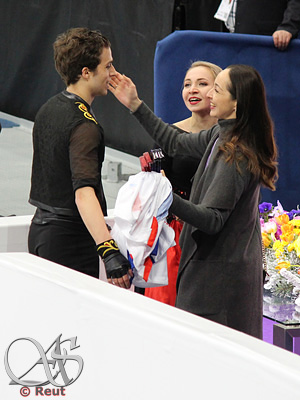 This season they have great programs, they work well, they are very motivated. I really enjoy working with them. They progress fast and I put high hopes on them.
This season they have great programs, they work well, they are very motivated. I really enjoy working with them. They progress fast and I put high hopes on them.
Last season had a great ending for both couples. Their last competition was Universiade and they both medaled (Popova/Mozgov won, Galyavieva/Thauron got bronze - ed). They had great performances, showed everything we worked on, for me it was a victory. Season 2018/19 was full of ups and downs, so I was very pleased we could finish it on a high note.
German couple, Katharina M├╝ller/Tim Dieck, has joined our group last July. They are here at this competition with me, our first competition together, first Challenger of the season. I think they are feeling well, from the very beginning we had a good rapport. Later this season we will fight to become national champions, so we have a lot of plans and a lot of pressure. But it always works like this, you need to push forward, you need to reach your objectives.
All three couples have big goals set and I hope they will achieve them. It's very important for me as their coach and it would be nice if they can really show everything we worked together on.
You mentioned pressure. In one of your recent interviews you said that now you feel a lot of pressure and also a lot of attention towards you. But you were one of the leading coaches for years, one of the legendary champions. I would've thought you never lacked attention. Why specifically last season? Because you started anew?
Maybe, yes. Everybody was curious about how my move will turn out, some people didn't believe me, thought it was only a PR trick, that I was only talking about moving to Russia. But I'm this kind of person - usually, if I say something, I do it; and then, well, things may work out or not. I tried to do it, I'm still trying and - yes, I feel a lot of attention on my persona. Maybe because in Russia I'm more popular than in the United States. And, actually, I like it. I always competed for the Russian team, all my medals at the European and World championships, in the Olympic Games, they all were for Russia, while in America they value their athletes more. Maybe it was one of the reasons why I came back - I wanted not exactly this attention, but acknowledgment from Russia. I proved myself as a Russian athlete, now I want to prove myself as a coach. And I feel that so far it goes pretty well. I work really hard to get the results I planned for myself.
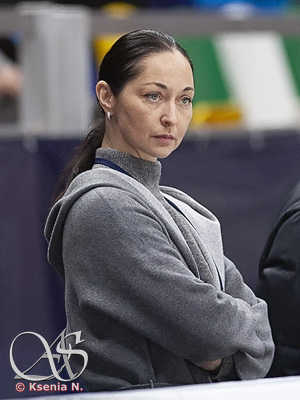 Is this attention you mentioned coming from fans, journalists, federation?
Is this attention you mentioned coming from fans, journalists, federation?
From journalists, from federation. I feel a lot of attention from everywhere. I get invitations to shows, presentations; there are a lot of people around me, a lot of action. And I love it! This suits me, I'm a very urban person. It's hard to even imagine that I spent more than twenty years of my life in the suburbs. Maybe that was another reason I wanted to move back and live in a big city. The energy is different, I love to always be busy, and I love to be a part of this stir.
Does this attention also mean help? Is it more support or responsibility?
You can look at it from various angles. Of course, it's a big responsibility to prepare Russian couples, to develop Russian ice dance, to use my style in my choreographies, in the look of my couples. It's great that I'm being noticed, that my couples get recognized.
In Moscow I have the possibility to work with multiple experts. It's much easier to find all the people we need for my team; it's a one phone call distance to anyone and anything from choreography, costumes to doctors, psychologists or anyone else we might need. I have a chance to meet very professional people in various areas, to develop myself as a coach, to develop my creative potential, my ideas.
And you also have theaters, ballets...
Of course, and I missed that a lot. I don't have a lot of free time, but I try to go out and draw upon ideas, meet new people, all this is very interesting to me.
I wonder if your participation in "Ice Age" (TV show produced by Ilia Averbukh in which celebrities and their professional skating partners perform in front of a panel of judges) also played a part in you being recognizable and famous now in Russia.
I think so. Even though that was ten years ago.
Of course, when Ilia called me, his proposition got me excited. We're close friends, I've known him for years, and we skated together since childhood, traveled to competitions together. He started a very interesting business, develops it very professionally and gives it his all. For me it was a huge experience; it was interesting to meet choreographers and actors. And I love performing. 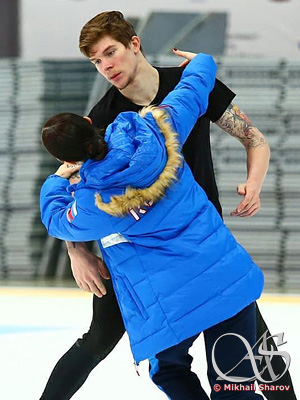 So when he proposed this to me, I agreed immediately, even though I had small children and it wasn't easy for me to leave. Luckily my husband supported me and let me do it, while he could have said: "Listen, are you out of your mind?!" And there was our skating school, competitions; it was September, the start of a new season, so we had to invite more coaches. But I simply couldn't miss this opportunity. And I was infinitely happy and grateful to Ilia for inviting me.
So when he proposed this to me, I agreed immediately, even though I had small children and it wasn't easy for me to leave. Luckily my husband supported me and let me do it, while he could have said: "Listen, are you out of your mind?!" And there was our skating school, competitions; it was September, the start of a new season, so we had to invite more coaches. But I simply couldn't miss this opportunity. And I was infinitely happy and grateful to Ilia for inviting me.
As someone who took part in this show and who is also a coach, it will be very interesting for me to know your opinion: don't you think that TV projects like this one "undervalue" real figure skating in a way? They create this illusion that you can learn to skate in three months, get "all 6.0" and "next year compete at the Olympic Games", an actual praise some of the judges said.
(laughs) You know, it's just a show, all this is done for the audience, these scores mean nothing professionally. The concept is absolutely different. All this is done to attract more viewers, the more so since we've had a completely different scoring system for years now. These "6.0" marks, they have this nostalgic feel to them, because they are familiar to the public since the times when Pakhomova/Gorshkov, Linichuk/Karponosov and Bestemianova/Bukin have been skating.
But, you know, people who took part in "Ice Age", actors, they've made tremendous efforts, it's very difficult to learn to skate in three months. I saw how nervous they were. But for them it was also an adrenaline rush, and it was interesting, a new experience, an opportunity to meet new people, to meet athletes who usually have very strong personalities. This juxtaposition of arts and sports - something that we have in our sport too-was an excellent idea.
What do you think about the test skates they do for the Russian team which are open to the general audience?
At first, I was surprised by this, because I remember how secretive everything was in Russia in the past, so for me it was a new experience. In the US, for example, similar test skates are completely "closed", nobody is allowed to attend, and each couple is discussed separately. But I don't think that at the end of August there is a reason for keeping things a secret, some people have their first competition in a few weeks. I think it's great that the arena was full and every skater was cheered on. Of course, it's the beginning of the season, programs are still "raw", not polished, but the general idea of such test skates is really good.
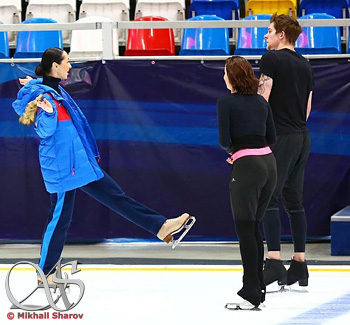 And what about never getting a second chance to make a first impression? Which is especially important in the ice dance I feel.
And what about never getting a second chance to make a first impression? Which is especially important in the ice dance I feel.
Yes, of course the first impression is very important, but even at earlier stages, with a "raw" program, without costumes, you can see the potential, you can feel whether this program will be loved or not. Yes, it won't be performed ideally and 100% clean, but it will leave an impression. And I know that everybody is preparing very seriously for these test skates.
As a professional in this field, maybe you can explain to me, what was the idea behind changing the name of the short dance to the rhythm dance?
I was already asked this question. (smiles) Me too, I didn't quite get it. Probably, it was done to differentiate the ice dance from the other skating disciplines, to emphasise the word "rhythm". Rhythm is important for every discipline, but especially for the ice dance. This requirement to skate to rhythm and not to melody is constantly mentioned during ISU seminars, we're always asked to pay attention to this. Probably, this is the only difference. In general in rules there were some technical changes, but short dance and rhythm dance are basically the same thing.
The rules in ice dance are changing too often, almost every off-season. To tell the truth, as a spectator and a fan I can't follow them! Do you think it's the right approach, to change rules so frequently?
I think it's hard for everyone to follow. In my opinion, if ISU could leave the rules unchanged for at least two seasons in a row, it would give more chances to coaches - and judges too - to go deep into them. And to do something interesting in programs instead of constantly deciphering the new rules. Sometimes those changes are finalized quite late, in June, while we start working on programs in April-May. So afterwards we need to add corrections, to invite experts and get their advice. All this takes time and effort.
I hope next season the rules will stay the same and then it will be much easier for us to add some creativity to our programs, because we already understood how the elements should go.
In general, now we work on choreography differently; first we set all the elements according to the music and then we add transitions, some interesting moves and details.
 Well, this is what single and pair skaters usually do.
Well, this is what single and pair skaters usually do.
Yes, and now ice dancers came to this too, because elements bring a lot of points, they have a lot of "weight" in the overall score, and everyone is trying to get as many points as possible. I should admit that now ice dance is by far more athletic. Before, for example, we didn't have off-ice conditioning during the season, we were busy with dancing on the floor, working on our programs in front of the mirror, we were focused more on the clean performance. But the programs used to have wholeness, they were not divided into elements. If you hear, based on the music, that there should be a lift, you do it there, if you feel a turn, you put in a turn. Back then transitions were very intricate, you didn't have elements separately and transitions separately, everything was important, every step, every transition, and every crossover. The program had continuity, there was no such thing as speeding up towards the element and then doing it. Now we're getting closer to the pair skating in a sense, a question was even posed: what is the difference between the ice dance and the pair skating now?
And what is the answer?
The answer is, probably, doing more complex transitions, choosing danceable, rhythmic music. There is a tendency now to take slow music, which is easier to skate to-easier physically, easier to complete all the elements and do all the steps. I understand that nobody wants to take a risk and skate to fast music, but this is what used to be a real dance before! We used to skate to fast rhythmic music. This tendency with slow music can be observed in dances on the floor as well, in the contemporary dance. But still, I think we need to have diversity, have something else present.
Well, your students definitely don't have a problem with being diverse...
(smiles) I'm trying. At least in the rhythmic dance. In general I'm trying to find different styles for my students. Like my coach did, when we, Lobacheva and Averbukh, Grishuk and Platov skated, we all had very different styles. But back then there were no such rules...
Now the rules are very strict, and the punishment is harsh, from the music and costumes to elements and timing of the lifts - we need to check them with a stopwatch. You can say that ice dance became more objective now. But this is still a very complicated topic. I think subjectivity in ice dance will always be present.
